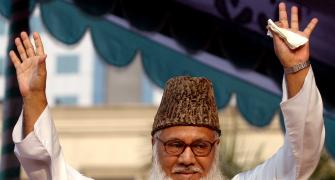'The government is saying 88 Hindus have been killed, but it could be much more.'
'Their properties are being looted, their businesses have been ransacked. I am getting distress calls from there.'
'Muslims who believe in the philosophy of Sheikh Mujibur Rahman are also under attack. Most of those who have fled Bangladesh after Sheikh Hasina's fall are Muslims.'

"The protection of minority rights is becoming a mass movement in Bangladesh. Hindus who have settled there are not fleeing, they are trying to fight back," says senior journalist Gautam Lahiri.
Mr Lahiri was formerly associate editor of the Bengali daily newspaper Sangbad Pratidin and has reported extensively from Bangladesh.
In a phone conversation with Rediff.com's Archana Masih, he discusses the attacks on minorities and four-months of Muhammad Yunus's interim government in Bangladesh.
How has the Muhammad Yunus-led interim government steered Bangladesh?
I don't know whether it was deliberate or a miss by Muhammad Yunus when he announced that he would 'reset the button'.
Reset the button means 'pre-1971 situation' when Bangladesh was a part of Pakistan.
The interim government is giving all kinds of concessions to Pakistan like giving easy visas for Pakistanis which was not done during Sheikh Hasina's regime.
The Pakistan embassy is very active in Bangladesh now.
Another important development is that the court has declared that 'Joi Bangla' is no more a national slogan. The slogan was created during the liberation movement and attempt is being made to erase the legacy of the liberation movement.
They are trying to change the name of the Hazrat Shahjalal airport who was a famous saint and rename it Zia-ur Rahman airport [after the late president].
There is uncertainty in the governance. The government has no accountability. They say that the people and students have given them power, but how do you judge whether you have the people's mandate because there is no democracy without parliament?
Muhammad Yunus is speaking in different voices and giving conflicting dates for the election. Sometimes he says it will be after 18 months, in another interview he said 2026 and told Al Jazeera that he would be there for three, four years.
[Yunus said in a speech on the 53rd anniversary of independence on December 16 that elections would be held at the end of 2025 or in 2026.]
The delay in elections will also lead to resentment among the political parties.
The anti-India campaign in Bangladesh is to divert attention from the real issues. They cannot control inflation and the economy is in a bad shape.
There is fear that they will not be able to pay salaries to government employees.
200 government factories which were foreign exchange earners are mostly closed. It is slowly picking up, but this has come as a boon for Indian manufacturing.
Secondly, they are trying to paint that Hindus and minorities are supporters of Sheikh Hasina's Awami League and hence are enemies of the country.

The Bangladesh government confirmed 88 attacks against Hindus. What is your assessment of the situation as far as minorities are concerned in Bangladesh?
Bangladesh society is divided or polarised into two main ideals.
The battle is between two ideologies -- the believers of the ideals of the liberation struggle and those against it. Bongobondhu Sheikh Mujibur Rahman wanted to build Bangladesh into a secular, democratic, socialist country around Bengali nationalism. But those against that idea were backed mainly by Pakistan and later on by Western forces.
The political journey of Bangladesh has always seen a see-saw between these two forces.
After the outser of Sheikh Hasina on August 5, the anti-liberation forces have become victorious and their ideology is running the country. They believe in an Islamic Bangladesh not a secular Bangladesh.
It is terrible even if even one Hindu is attacked in Bangladesh. Just like it is terrible if even one minority person is attacked in India.
The government is saying 88 Hindus have been killed, but it could be much more.
Their properties are being looted, their businesses have been ransacked and many people are becoming jobless. I am getting distress calls from there.
Muslims who believe in the philosophy of Sheikh Mujibur Rahman are also under attack. Most of those who have fled Bangladesh after Sheikh Hasina's fall are Muslims.

What do you see as the future of the minorities in Bangladesh?
The reprisal against minorities has united them.
Bangladesh's first liberation movement was on the basis of language. The protection of minority rights is becoming a mass movement and secular-minded Muslim people will also join them.
It is an evolving situation. It will be an interesting development if a kind of minority revolt takes place which I have not seen anywhere in the world.
So Bangladesh is a very interesting case for study.
That is why Hindus who have settled down there are not fleeing, they are trying to fight back.
They will not leave unless they are compelled.
People are looking for a leader and by arresting Chinmoy Krishna Das, the Bangladesh government has made him into a leader. He has become the face of the minority there.
I am not saying that this will lead to a revolution, but it is an evolving situation that has to be watched carefully.

The interim government in Bangladesh lifted the ban on the extremist Jamat-e-Islami party and Muhammad Yunus is increasingly being seen as a puppet in the hands of the Jamat.
Are radical groups influencing the interim government?
At least 70 dreaded terrorists who believe in the pan Islamic movement have been freed.
Members of Ansarullah Bangla, a dreaded terrorist group, and Hizbut Tahir, another terrorist group banned in many countries, had been imprisoned by the Sheikh Hasina government. They are free now.
Bangladesh, a country of Sufi Islam, was slowly influenced by Wahabbi Islam. Followers of Hizbut Tahir believe the country should follow radical Islam.
There are a sizable section of Muslim fundamentalist outfits in Bangladesh.
Feature Presentation: Aslam Hunani/Rediff.com









